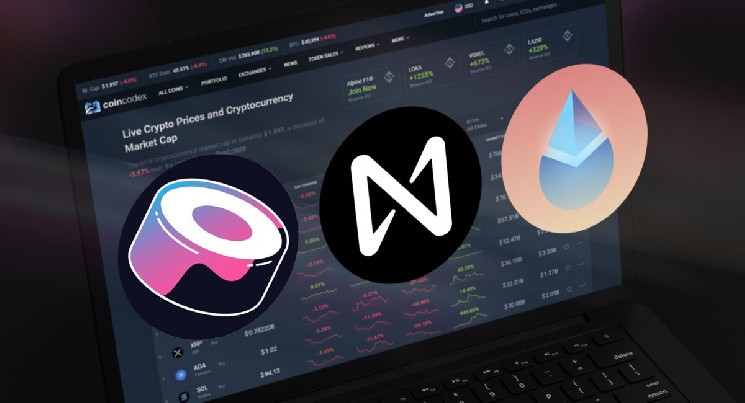Lido Gets #1 Spot with stETH Launching on Layer 2 Platforms—Top 3 Coins to Watch for Oct 10—Oct 16

With Bitcoin still hovering around the $20,000 price level, the action in the cryptocurrency markets hasn’t been too interesting as of late. However, that doesn’t mean that there’s no exciting developments on the fundamental side. Let’s take a look at 3 cryptocurrency and blockchain projects that will be worth watching this week.
3. Sushi (SUSHI)
Sushi is a community-owned project that has created a suite of decentralized finance services. The project was initially started in 2020, launching a Uniswap fork called SushiSwap. The project’s innovation was to reward liquidity providers on its decentralized exchange with SUSHI governance tokens. This brought a surge of liquidity to SushiSwap at the expense of Uniswap, and essentially forced the Uniswap team to launch the UNI token shortly after.
Even though SushiSwap seemed a real threat to Uniswap for a while, it now has much smaller trading volumes and lower liquidity. However, Sushi is still a notable decentralized finance project, and offers a suite of DeFi services including token swaps, lending, borrowing and yield farming.
Users can stake their SUSHI tokens to earn a portion of the swap fees that are paid to SushiSwap. Users can still participate in the governance process even after staking thanks to the xSUSHI token, which is issued to stakers.
Why SushiSwap? The project has elected a new Head Chef, GoldenTree reveals SUSHI token holdings
Even though Sushi is currently not among the most hyped DeFi projects, there have been some interesting developments as of late that make it worth keeping an eye on. Asset management firm GoldenTree, which has an AUM of about $47 billion, has revealed that they hold more than 3.9 million SUSHI tokens, which translates to about $5.2 million. In a post on the Sushi discussion forums, a GoldenTree employee disclosed an Ethereum wallet in which the company holds its SUSHI tokens. The employee says that GoldenTree can assist the Sushi project on matters of tokenomics and protocol design.
The Sushi project has also recently elected former Bitfineon CEO Jared Grey as its new “Head Chef”. Grey received 84% of the vote, which was conducted through SUSHI tokens. The new Head Chef says he is planning to improve the efficiency of the Sushi project, which would allow it to launch new products to win a bigger market share. The successful election of a new leader could bring more stability to the Sushi project, which struggled with internal turmoil earlier this year.
2. NEAR Protocol (NEAR)
NEAR Protocol is a blockchain platform for smart contracts which emphasizes scalability and developer-friendliness. NEAR Protocol is based on Proof-of-Stake, and launched its Nightshade sharding solution in November of 2021.
Instead of having to learn a new programming language, developers can write smart contracts for NEAR Protocol in languages like Rust and AssemblyScript. The NEAR blockchain’s smart contract capabilities support popular use cases like decentralized finance (DeFi) and non-fungible tokens (NFTs). NEAR also offers Ethereum Virtual Machine (EVM) compatibility through the Aurora platform.
Why NEAR? NEAR Foundation partners with Google Cloud
NEAR Foundation has reached a partnership with Google Cloud to provide technical support for web3 projects that are building on NEAR Protocol. Google Cloud’s infrastructure will be used by Pagoda, a platform providing key services for startups on NEAR.
The Pagoda platform offers tools that allow NEAR developers to test their decentralized applications and securely deploy them to the NEAR mainnet. Following the DApp’s launch, developers can use the Pagoda platform to monitor real-time usage analytics. Pagoda also has a JavaScript SDK (software development kit), allowing developers to create their DApps with the popular programming language.
NEAR Foundation CEO Marieke Flament commented on the partnership:
“This partnership marks a new chapter for us as we continue to offer the best support possible for the next generation of visionaries choosing to build on the NEAR protocol.”
1. Lido DAO Token (LDO)
LDO is the governance token of Lido DAO, a decentralized autonomous organization that oversees the Lido liquid staking protocols. Through the DAO, LDO holders can decide on important protocol parameters including fees and assigning node operators and oracles. Lido makes it possible for users to retain liquidity even when they’re staking their coins.
The protocol issues tokens to represent staked coins, for example stETH for staked ETH. Tokens like stETH can be traded or deployed in DeFi protocols to earn yield. Lido provides liquid staking services for different blockchains, including Ethereum, Solana, Kusama and Polygon.
Why LDO? Lido now supports stETH on Arbitrum and Optimism
Lido has made a move into Ethereum-based layer 2s, allowing the stETH token to be wrapped and bridged over to Arbitrum One and Optimism. In addition, the project has also announced 150,000 LDO in liquidity mining incentives to promote liquidity for wrapped stETH. Protocols that will offer the incentives include Beethoven X, Balancer, Curve, Kyber and Velodrome.
Lido is now on L2 ?️
Bridge your staked ETH to Layer 2 protocols at the click of a button to benefit from lower gas fees and exciting DeFi opportunities.
— Lido (@LidoFinance) October 6, 2022
Arbitrum One and Optimism are layer 2 platforms that function on top of the Ethereum blockchain and provide significantly faster and cheaper transactions. Both are based on a technique called optimistic rollups, where a large number of layer 2 transactions is bundled together and submitted to the Ethereum blockchain.
Lido continues to dominate Ethereum staking. According to data from Nansen, the Lido protocol accounts for 4.25 million staked ETH, out of a total of 14.2 million staked ETH.






 Bitcoin
Bitcoin  Ethereum
Ethereum  Tether
Tether  USDC
USDC  TRON
TRON  Dogecoin
Dogecoin  Cardano
Cardano  Bitcoin Cash
Bitcoin Cash  Monero
Monero  Chainlink
Chainlink  LEO Token
LEO Token  Stellar
Stellar  Zcash
Zcash  Litecoin
Litecoin  Hedera
Hedera  Dai
Dai  Cronos
Cronos  OKB
OKB  Tether Gold
Tether Gold  Ethereum Classic
Ethereum Classic  KuCoin
KuCoin  Cosmos Hub
Cosmos Hub  Gate
Gate  Algorand
Algorand  Dash
Dash  VeChain
VeChain  Tezos
Tezos  Stacks
Stacks  TrueUSD
TrueUSD  Decred
Decred  IOTA
IOTA  Theta Network
Theta Network  Basic Attention
Basic Attention  NEO
NEO  Synthetix
Synthetix  Qtum
Qtum  0x Protocol
0x Protocol  Ravencoin
Ravencoin  Zilliqa
Zilliqa  DigiByte
DigiByte  Nano
Nano  Siacoin
Siacoin  Numeraire
Numeraire  Waves
Waves  Ontology
Ontology  Enjin Coin
Enjin Coin  Status
Status  BUSD
BUSD  Hive
Hive  Pax Dollar
Pax Dollar  Lisk
Lisk  Steem
Steem  Huobi
Huobi  OMG Network
OMG Network  Bitcoin Gold
Bitcoin Gold  NEM
NEM  Augur
Augur